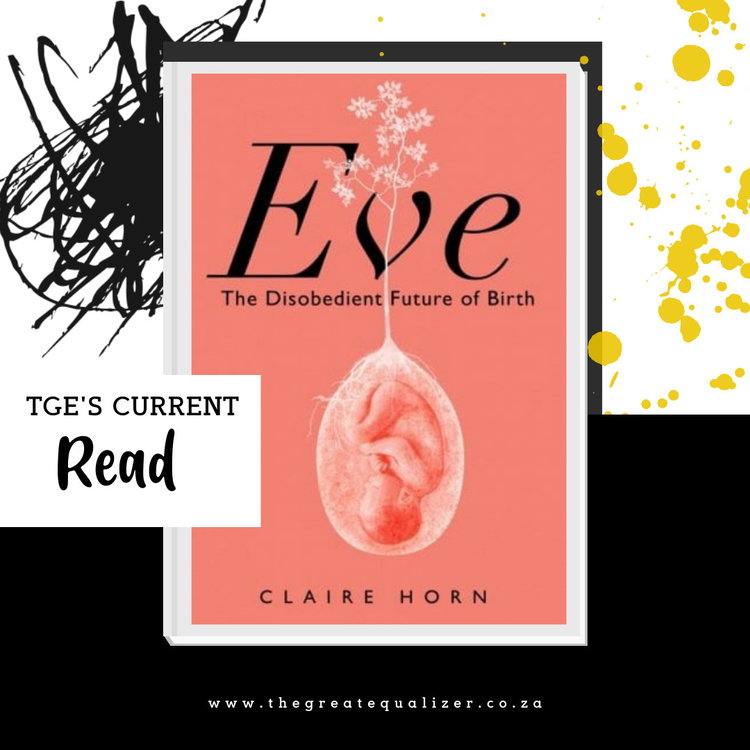
Eve: The Disobedient Future of Birth by Claire Horn
Loading player...
"We are closer than ever to the first pregnancy outside of the human body... but are we ready for the radical future of birth?"
Host of TGE's Current Read Sam Herbst chats with author and feminist academic Claire Horn about her book, Eve: The Disobedient Future of Birth.
Eve is a radical interrogation of the ethics and future of birth, detailing the near-future probability of ectogenesis, AKA artificial human gestation (babies created in and born from machines).
We're not talking science fiction here, folks. Radical technological developments are making it possible for babies to be created and gestated outside of the human body, and Eve explores what this will mean for us as a race.
Horne delves into the complex legal, social and ethical questions that ectogenesis raises, and explores what this scientific breakthrough might mean for motherhood, womanhood and parenthood. She also breaks down the history of artificial gestation, which goes back decades, and considers what the sociopolitical implications might be in countries that don't respect the autonomy of pregnant people.
Horne is a wealth of knowledge when it comes to the intersection of science, ethics and matrescence, giving measured insight into a complex and ethically fraught topic.
LISTEN. LIKE. SHARE. SUBSCRIBE.
And please let us know what you think of the episode!
__
ABOUT THE AUTHOR:
Claire Horn is a postdoctoral research fellow at Dalhousie University's Health Law Institute. Her work over the last six years has focused on law and policy governing sexual and reproductive health, rights, and technologies. She has written for a variety of academic and nonfiction publications, including the Journal of Medical Ethics, the Medical Law Review, Feminist Legal Studies, Catalyst, Aeon, and Lady Science.
#ectogenesis #ectobirth #artificialwomb #artificialbirth #matrescence #feminism #biotechnology #currentread #tbr #thegreatequalizer @jonathanballpublishers2050 @WellcomeCollection
__
BLURB:
Throughout human history, every single one of us has been born from a person. So far. But that is about to change.
Scientific research is on the cusp of being able to grow babies outside human bodies, from machines, for the very first time. Claire Horn takes us on a truly radical and urgent deep dive into the most challenging and pertinent questions of our age. Could artificial wombs allow women to redistribute the work of gestating? How do we protect reproductive and abortion rights? And who exactly gets access to this technology, in our vastly unequal world?
In this interrogative and fascinating story of modern birth, Eve imagines with eye-opening clarity what all this might mean for the future of humanity. Claire Horn takes us on a journey from the first orchid-like incubators in the 1880s to the cutting-edge scientific breakthroughs of today. As she explores the most challenging and pertinent questions of our age, Horn reflects on her own pregnancy. Could artificial wombs allow women to redistribute the work of gestating? How do we protect reproductive and abortion rights? And who exactly gets access to this technology, in our vastly unequal world?
Host of TGE's Current Read Sam Herbst chats with author and feminist academic Claire Horn about her book, Eve: The Disobedient Future of Birth.
Eve is a radical interrogation of the ethics and future of birth, detailing the near-future probability of ectogenesis, AKA artificial human gestation (babies created in and born from machines).
We're not talking science fiction here, folks. Radical technological developments are making it possible for babies to be created and gestated outside of the human body, and Eve explores what this will mean for us as a race.
Horne delves into the complex legal, social and ethical questions that ectogenesis raises, and explores what this scientific breakthrough might mean for motherhood, womanhood and parenthood. She also breaks down the history of artificial gestation, which goes back decades, and considers what the sociopolitical implications might be in countries that don't respect the autonomy of pregnant people.
Horne is a wealth of knowledge when it comes to the intersection of science, ethics and matrescence, giving measured insight into a complex and ethically fraught topic.
LISTEN. LIKE. SHARE. SUBSCRIBE.
And please let us know what you think of the episode!
__
ABOUT THE AUTHOR:
Claire Horn is a postdoctoral research fellow at Dalhousie University's Health Law Institute. Her work over the last six years has focused on law and policy governing sexual and reproductive health, rights, and technologies. She has written for a variety of academic and nonfiction publications, including the Journal of Medical Ethics, the Medical Law Review, Feminist Legal Studies, Catalyst, Aeon, and Lady Science.
#ectogenesis #ectobirth #artificialwomb #artificialbirth #matrescence #feminism #biotechnology #currentread #tbr #thegreatequalizer @jonathanballpublishers2050 @WellcomeCollection
__
BLURB:
Throughout human history, every single one of us has been born from a person. So far. But that is about to change.
Scientific research is on the cusp of being able to grow babies outside human bodies, from machines, for the very first time. Claire Horn takes us on a truly radical and urgent deep dive into the most challenging and pertinent questions of our age. Could artificial wombs allow women to redistribute the work of gestating? How do we protect reproductive and abortion rights? And who exactly gets access to this technology, in our vastly unequal world?
In this interrogative and fascinating story of modern birth, Eve imagines with eye-opening clarity what all this might mean for the future of humanity. Claire Horn takes us on a journey from the first orchid-like incubators in the 1880s to the cutting-edge scientific breakthroughs of today. As she explores the most challenging and pertinent questions of our age, Horn reflects on her own pregnancy. Could artificial wombs allow women to redistribute the work of gestating? How do we protect reproductive and abortion rights? And who exactly gets access to this technology, in our vastly unequal world?





